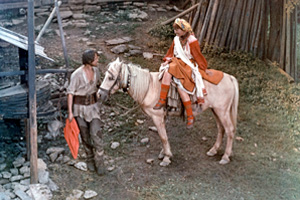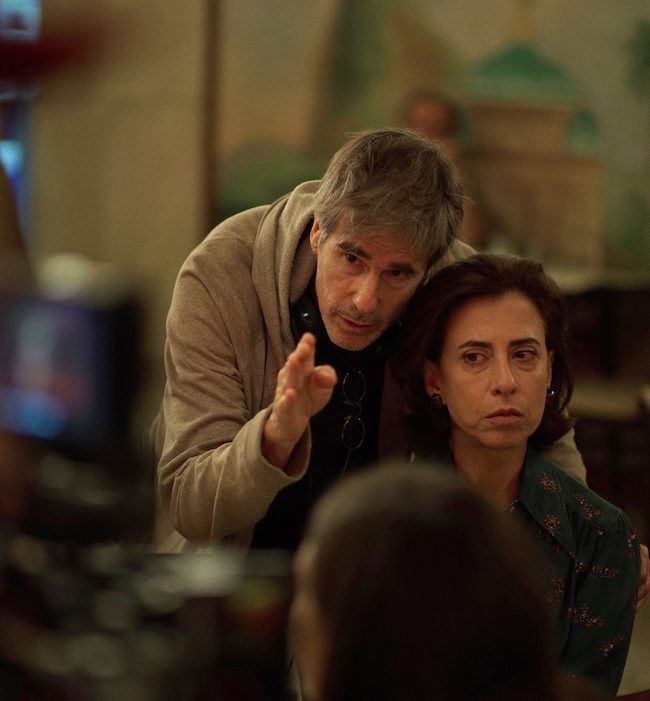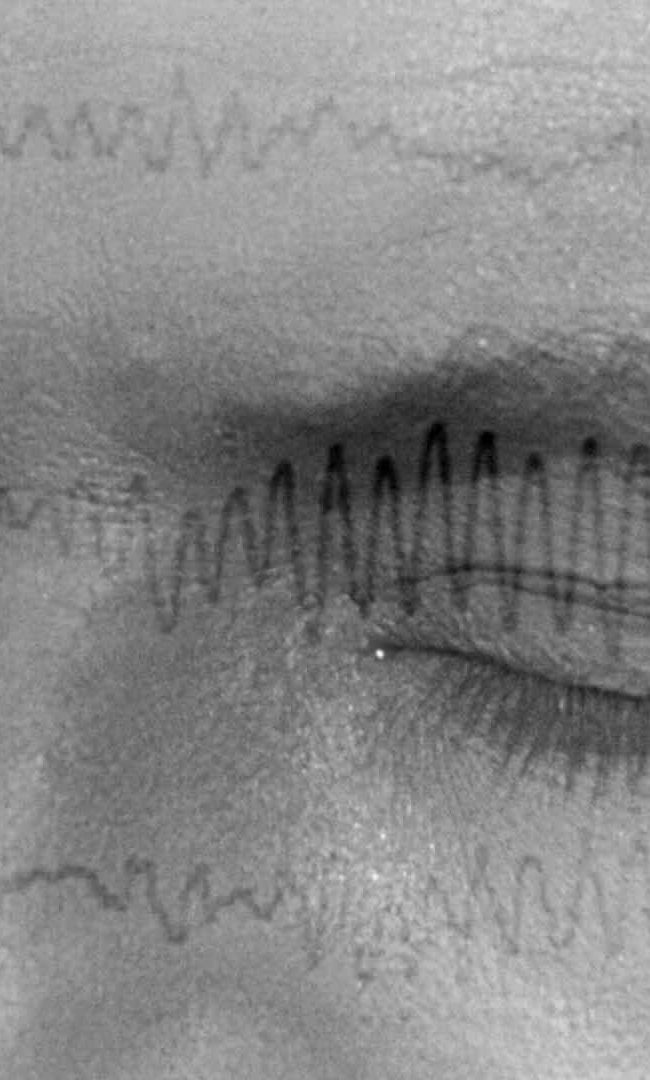(Shadows of Forgotten Ancestors screens Sunday night, April 19th, at 11pm as part of the Cinema Nolita/Hammer to Nail screening series in downtown Manhattan. You can also buy the special edition DVD at Amazon.)
The throes of love and desire are no simple capture, nor a surefire slay in the battle of image and sound on screen. They are, in fact, the most treacherous of realms to navigate with the intention of putting forth through cinema an example of that which we seek so blindly and are so often driven by, propelled headfirst into some form of joy, madness, or sorrow, like no other thing.
In the short history of moving pictures, there are few who have captured this realm on film so succinctly, so gracefully, and so without any hesitance or fear, as Sergei Parajanov. A Georgian born director of Armenian ancestry, jailed by the Russian government for much of his adult life for acts of supposed official depravity (i.e. being queer, and defiling fellow Party members through his exploits), he managed in a relatively hostile creative environment to create series upon series of images and stories that encapsulate the luscious, painterly qualities of exactly the kind of magic and fascination that only filmmaking, as a craft, is capable of. In a time when the reality of social struggles seemed all the rage (and was the only genre of cinema officially endorsed by the USSR), Parajanov drew from his own history, from folklore, and from natural mysticism in order to create an amalgam of engaged and forceful cinematic performances, rich with costume, set design, and camera work ahead of its time.
Shadows of Forgotten Ancestors (also known as Wild Horses of Fire) is no different. The story of two lovers who gain intimate knowledge of each other at a young age, son and daughter of rival, hateful families, it finds itself in a class of its own in just how it chooses to relentlessly extrapolate the notion of true love found, lost, and bred into mortal obsession.
 We meet Ivan and Marichka in the Carpathian highlands of Ukraine, members of the small subset of people known as the Hutsul. Their Montague and Capulet—like orientation to each other fades as Ivan consistently—across the course of many years yet told in the breath of a few moments—enchants Marichka, and becomes enchanted by her. They run wild on hillsides and in small streams, and the scenes of their love’s beginnings are some of the most accurate depictions of child’s play that can be found. Parajanov illuminates the beauty of these innocent, traditional lives and their growth into complex, devoted adulthoods, filled with passions and dreams that lead them helplessly astray. He shows us the naïve, the blissful, and the perilous in their hearts and making. In one scene, the two lovers enrapped in thin sapling branches, deep in the forest of their village, float as if on air, traversing effortlessly the twigs and limbs of the trees, all seemingly bare and skeletal. They move towards each other through the branches like magic, without any of the rhythmic rise and fall of normal, mortal steps. Instead they seem to be levitated, quite literally swept off their feet. It is only when the forest itself begins to rotate, hypnotically around them, that the level of artistry at work becomes clear.
We meet Ivan and Marichka in the Carpathian highlands of Ukraine, members of the small subset of people known as the Hutsul. Their Montague and Capulet—like orientation to each other fades as Ivan consistently—across the course of many years yet told in the breath of a few moments—enchants Marichka, and becomes enchanted by her. They run wild on hillsides and in small streams, and the scenes of their love’s beginnings are some of the most accurate depictions of child’s play that can be found. Parajanov illuminates the beauty of these innocent, traditional lives and their growth into complex, devoted adulthoods, filled with passions and dreams that lead them helplessly astray. He shows us the naïve, the blissful, and the perilous in their hearts and making. In one scene, the two lovers enrapped in thin sapling branches, deep in the forest of their village, float as if on air, traversing effortlessly the twigs and limbs of the trees, all seemingly bare and skeletal. They move towards each other through the branches like magic, without any of the rhythmic rise and fall of normal, mortal steps. Instead they seem to be levitated, quite literally swept off their feet. It is only when the forest itself begins to rotate, hypnotically around them, that the level of artistry at work becomes clear.
While this love and purity seems to exist in a safe and assured world for our characters, as with every other tale of joy and pleasure, there is sorrow upon the horizon. Eventually separated by fate from Marichka, Ivan finds solace only in his memory of her, in his longing, never fulfilled. Marrying a new woman, Palagna, Ivan finds nothing of the comfort and clarity that his youthful adventures with Marichka once bred so steadfast in him. Instead, he is haunted by visions. The truth behind his eyes, his madness, becomes synonymous with the beauty he once knew, loved, and now must search for, to the empty, loveless frustration of his new wife. There is no more poignant a scene than that of their wedding ceremony to play as an example, a foreboding of what’s to come for these characters—yoked and blindfolded, led to encircle each other by the townspeople, their families, the two are almost like statues in the origin of their matrimony. They seem to be reciting vows of pantomime only, like two debtors in the colonial stocks, until the oxen yoke holding their heads so close together clatters to the earthen floor and their veils are lifted. Palagna stares back at her new husband, as he undresses her, pulling every garment from her in a still, shocking stare, until finally not even her rosary remains safe on her body. The wedding party looks on, and while Palagna is quite startlingly beautiful, the one thing she is not, and cannot ever be, is Marichka, her husband’s dream.
We find ourselves consistently at the hands of a true master in Parajanov’s work. The pictures themselves personify the three standards he himself saw so lacking in the cinema of his age: “…experience, craftsmanship, and good taste.” There can be no more touching a story than that of Ivan and Marichka, and in the same instance, with all of its complexity and grandeur, no more simple of one. It is a breath of magic told in a traditional, almost alien lifestyle, and much welcomed. The great Andrei Tarkovsky, who inspired and was in turn inspired by Parajanov’s efforts, once said in a plea to the Soviet government that, “He is guilty – guilty of his solitude. We are guilty of not thinking of him daily and of failing to discover the significance of a master.” His reverence leads us to another veneration, much cited, from the Soviet critic Alexei Korotyukov, who said simply: “Paradjanov made films not about how things are, but how they would have been had he been God.” And there comrades, we have it.
— Evan Louison











